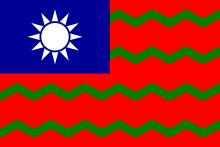Chinese Imperial Maritime Customs

Ensign of the Chinese Maritime Customs Service, 1931–1950
|
|
| Agency overview | |
|---|---|
| Formed | 1854 |
| Dissolved | 1950 |
| Superseding agency |
|
| Type | National |
| Jurisdiction |
|
| Headquarters |
Peking (1854–1929) Shanghai (1929–1941) Chungking (1941–1949) Taipei (1949–1950) |
| Minister responsible |
|
| Agency executives |
|
| Parent agency | Ministry of Finance |
| Imperial Maritime Customs Service | |||||||
| Traditional Chinese | 大清皇家海關總稅務司 | ||||||
|---|---|---|---|---|---|---|---|
| Simplified Chinese | 大清皇家海关总税务司 | ||||||
|
|||||||
| Transcriptions | |
|---|---|
| Standard Mandarin | |
| Hanyu Pinyin | Dà Qīng huángjiā hǎiguān zǒngshuìwùsī |
The Chinese Maritime Customs Service was a Chinese governmental tax collection agency and information service from its founding in 1854 until it split in 1949 into services operating in the Republic of China on Taiwan, and in the People's Republic of China. From its foundation in 1854 until the collapse of the Qing dynasty in 1911, the agency was known as the Imperial Maritime Customs Service.
Prior to signature of the Treaty of Nanking by the Chinese and British governments in 1842, all foreign trade in China operated through the monopoly Canton System centered on the Southern Chinese port of Canton (now Guangzhou). The treaty abolished this monopoly and opened the further ports of Shanghai, Amoy (Xiamen), Ningpo (Ningbo) and Fuchow (Fuzhou) to international trade and brought with it the need for a mechanism to collect customs duties payable on business transacted in these places.
Largely staffed at senior levels by foreigners, the Service was controlled by Chinese central government throughout its history. It was effectively established by foreign consuls in Shanghai in 1854 to collect maritime trade taxes that were going unpaid due to the inability of Chinese officials to collect them during the Taiping Rebellion. Its responsibilities soon grew to include domestic customs administration, postal administration, harbour and waterway management, weather reporting, and anti-smuggling operations. It mapped, lit, and policed the China coast and the Yangtze. It conducted loan negotiations, currency reform, and financial and economic management. The Service published monthly Returns of Trade, a regular series of Aids to Navigation and reports on weather and medical matters. It also represented China at over twenty world fairs and exhibition, ran some educational establishments, and conducted some diplomatic activities. Britons dominated the foreign staff of the Customs, but there were large numbers of German, U.S., French, and later Japanese staff amongst others. Promotion of Chinese nationals into senior positions started in 1929.
...
Wikipedia
